 |
|
Visitors wearing masks take selfie at Tian'anmen Square in Beijing on Jan 1. [Photo/CFP] |
Beijing reached its annual target for reducing hazardous pollutants in 2015 and is drafting a long-term plan to improve air quality to the clean level by around 2030, the municipal environmental watchdog said on Monday.
In 2015, the capital saw 186 days with air quality that was better than the national safety standard, 14 days more than the number in 2014, said the annual report on air pollution control from the Beijing Environmental Protection Bureau on Monday.
Additionally, from the detailed data on hazardous pollutants, the annual average reading in Beijing of PM2.5-airborne particulate matter with a diameter less than 2.5 microns that can penetrate the lungs and harm health-fell to 80.6 micrograms per cubic meter in 2015, the report said.
The annual reading was a reduction of 6.2 percent year-on-year, surpassing the annual goal of a 5 percent reduction. However, the reading was still above the national safety standard of 75 micrograms per cubic meter.
Despite the goal's achievement, some residents have called for a bigger improvement, especially since experiencing spells of severe smog in the capital since November.
"PM2.5 pollution is still the prominent problem in Beijing and requires strengthened efforts," said Fang Li, deputy director of the bureau.
There was a clear reduction in the three other major airborne pollutants-sulfur dioxide, nitrogen dioxide and PM10. The annual average reading for sulfur dioxide, for example, was lowered to 13.5 micrograms per cubic meter in 2015, much better than the national safety standard of 60, the report said.
However, the municipal government has issued two red alerts, the highest emergency response, to control the worsening conditions. Thus, many people thought the target would be missed.
"I didn't feel the clear improvement in air quality in the winter, and many of my friends and colleagues have coughed and experienced sore throats due to the bad air recently," said Chen Yang, 29, who works in a printing house in Beijing.
Li Li, a 52-year-old civil servant in Beijing, said the average reading of PM2.5 might have improved, but she felt the smog came more frequently. "When might we feel the real improvement, instead of the data?"
